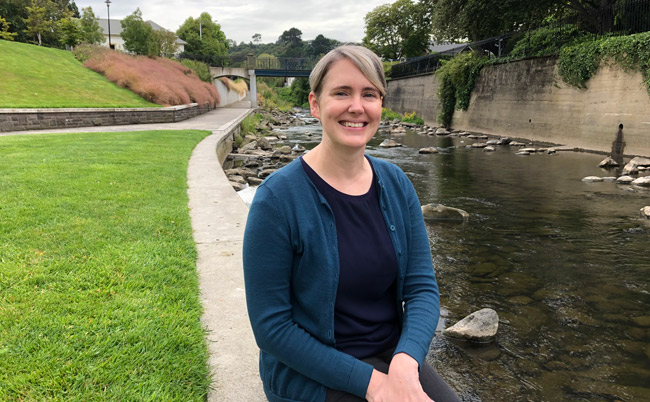Wednesday 13 February 2019 10:31am

Chemistry Senior Lecturer Dr Christina McGraw is looking forward to the inaugural Commonwealth Ocean Acidification Action Group Workshop - being hosted on the Dunedin campus next week.
Representatives from Commonwealth countries will converge on Dunedin this month as the University is the venue for the first workshop on ocean acidification.
Chemistry Senior Lecturer Dr Christina McGraw says ocean acidification (OA), where the pH of seawater drops as the ocean absorbs rising carbon dioxide levels, is a very real issue.
“It’s something that’s happening now,” she says. “In parts of the United States, the aquaculture industry has already seen the impacts of ocean acidification on their ability to raise oyster larvae.
"Ocean acidification is particularly relevant to New Zealand not only because we are very connected to the marine environment, but also because we have one of the world’s largest exclusive economic zones."
“Ocean acidification is particularly relevant to New Zealand not only because we are very connected to the marine environment, but also because we have one of the world’s largest exclusive economic zones.”
From 17 to 19 February, Otago will be the venue for the inaugural Commonwealth Ocean Acidification Action Group Workshop, bringing about 45 international experts together to share knowledge to better understand and address the impacts of OA.
The workshop is the first activity of the Commonwealth Ocean Acidification Action Group. New Zealand volunteered to champion the group as part of its support for the Commonwealth Blue Charter – an agreement by all 53 Commonwealth countries to collaborate to solve ocean-related problems and sustainably manage the ocean.
“We have people coming with a range of experiences, ecosystems and impacts, so this will be a great forum to learn from each other. We are all looking at the same problem but each country will feel the impacts differently,” Dr McGraw says.
Otago has a long involvement with the issue of OA. It started with the Munida Time-Series, a collaborative project with the National Institute of Water and Atmospheric Research.
"We can’t fix OA until we start reducing carbon emissions, but there are a lot of ways to plan and mitigate the impacts. This workshop will be an excellent forum to share that knowledge and experience."
Since data collection began in 1998, ocean carbon chemistry has been measured every second month off the Otago coast along a 65 mile transect that crosses three bodies of water.
“Otago has been operating as a collaborative OA community for a long time,” Dr McGraw says.
“Chemists are working alongside marine scientists, botanists and ecologists, so our projects tend to be broad.”
Dr McGraw arrived at Otago for postdoctoral study in 2006 and joined the group of researchers and community members that grew into the New Zealand Ocean Acidification Community (NZOAC).
She is now the chairwoman of the NZOAC Council, representing about 200 interest groups including researchers, government scientists, policy-makers, marine farmers and aquaculture operators across New Zealand.
Dr McGraw’s specific OA research is building sensors to monitor marine environmental change.
“I like working with my hands, going into the field with my students, and working with members of the community who are passionate about the ocean and protecting its future health.”
“We can’t fix OA until we start reducing carbon emissions, but there are a lot of ways to plan and mitigate the impacts. This workshop will be an excellent forum to share that knowledge and experience.”
